Unto the Least of these My Brethren
The weekly Tuesday evening gathering at Four Rivers Outreach is a combination camp meeting, pep rally, Alcoholics Anonymous session, gospel song fest, and tent revival—sans the tent—with a leavening of motivational self-help positive thinking thrown in for measure. It starts with introductions. “Who’s here for the first time?” says the woman with the microphone. “Stand up and tell us who you are and how you got here.”
In a back corner, near the main entrance to the hall, a young woman rises. She gives her name, “…and my friend, Holly, brought me.” The audience responds with an enthusiastic but slightly uncoordinated greeting. A few chairs away a man of about forty with long hair, a mustache, and the dark, leathery complexion of someone who spends a lot of time in the sun stands. “She’s been trying to get me to come,” he says, indicating the woman sitting next to him. “So I finally did.”
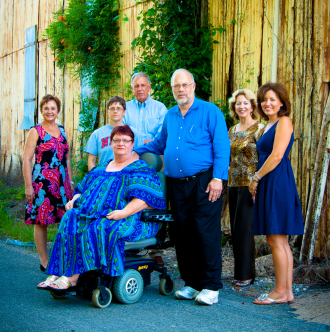
And so it goes, as a dozen or so new comers stand up, some eagerly, others, with a hint of embarrassment, state their name, generally acknowledge the influence of someone else, a friend, a roommate, a significant other, in getting them to the gathering, and quickly sit back down.
Harry Gibson is a volunteer. He is a retired chemistry professor from Austin College.
I started coming down here from curiosity. Someone told me about Four Rivers and suggested that as someone interested in the Christian faith reaching out beyond the people who wear coats and ties, I ought to be familiar with it. The first five or ten times I came down here was on Tuesday nights. They call it ‘Relationship Class.’ It’s where clients and volunteers just get together. It’s part cheerleading, part sharing, part worship, and then a meal.
I was interested in anything that takes Christianity beyond the eleven o’clock to twelve o’clock Sunday worship service. I love that, but I know there are some people who are not going to respond to the traditional church service. I was interested that Four Rivers, in addition to helping people work through hard times, had some Christian content. Since I became involved with the relationship class and then with the G.E.D. training, I found that they are pretty doggone strong on both of them.
If you were to come in here any afternoon, you would find that the overall tone is one of openness. When you walk down the hall, you don’t ever look the other way, you say, ‘Hello, how are you?’ There’s always a ready smile, and the smiles come from people who have really several needs, economic needs, family needs, or dependency needs. That doesn’t matter. There’s a receptivity here, openness. There is very little of the ‘don’t get in my territory’ sentiment.
The first time I came down here I wasn’t sure I was going to come back. I didn’t know most of the people. Most of them I found it hard to identify with. But after you come and begin to talk to people, to put a name and a face together, it is easier to be here. Four Rivers grows on you.
I couldn’t talk about Four Rivers without talking about Arthur and Jeannie Horn. If you come down on Tuesday night, just watch the two of them in action—no, don’t watch them, feel them.
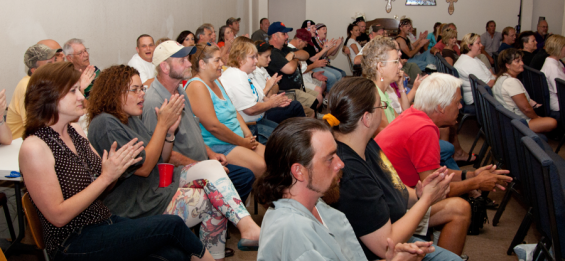 I’ve never seen anybody come in but what Jeannie calls them by name. She loves these people.
I’ve never seen anybody come in but what Jeannie calls them by name. She loves these people.
It would not be too strong a term to use the word ‘love.’ There really is an interest from those who volunteer in expressing love and acceptance to those who have greater needs than we do. If you are someone who finds relationships meaningful, then you’ll find something of value here. If you find that hokey, then you won’t stay around Four Rivers very long.
“Who has a testimonial?” says Jeannie Horn, the woman with the microphone, when the introductions are finished. Immediately a man on the front row raises his hand, acknowledges a nod from the moderator and stands, facing the audience. “I’ve been clean for three months, for ninety-three days today,” he says, and the crowd breaks into cheers and applause. The avowal encourages others, and hands go up in different parts of the room, and one by one they stand up and recount their success in turning back or holding off the demons that have consumed them in the past. A month, three weeks, ten years, a few days, each success, however short, however temporary, is acknowledged with support from the crowd.
And there is more to celebrate than just sobriety. “I called my sister,” says a woman. “We got together last weekend. I hadn’t seen her in twelve years.” “I got a job,” announces someone else standing off to the side, and the audience cheers. Revelations of reconciliations with friends and families rent by the effects of substance abuse draw approbation as well. So do other successes, achievements which for most people would seem of little note—a place to live, a secondhand car, a child coming back home—but for people long down, such accomplishments loom large. The recitations continue as more people rise to testify, buoyed by the unqualified acceptance of the audience.
Lanetta Nix of Sherman is a volunteer and a sits on the Four Rivers board of directors.
I learned about Four Rivers from my brother-in-law, who is an attorney who does some criminal work. I think he learned about Four Rivers through the drug court. The first time I came, it was really overwhelming. I felt uncomfortable and not quite sure how to talk to the people I met here. I was very ill at ease, but there was such a draw that I had to keep coming back.
The more I got to know the people, the more I recognized the enormity of the problems. It was humbling to realize there was such great need. I didn’t realize there was such an addiction problem in Sherman, that the drug problem was so prevalent. My life had been sheltered from all of that, and I was just shocked.
I’ve always had the idea that people just needed to behave themselves. I didn’t understand what got people into these ditches, where they just could not get out, and the huge need for motivation. Watching Arthur and Jeannie help these people get up out of that ditch was just remarkable, and I thought that if there was anything I could do to help their efforts, I wanted to do it.
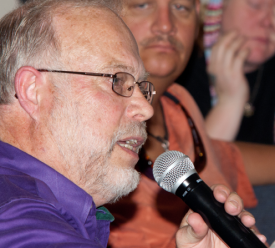 I come by several times a week, when I have a spot of time. There’s always a lot of work to do, so there’s room to jump in and help. I have worked a lot with fund raising, but I peel potatoes, too. I come as many Tuesday nights as I can, and I’ve brought other people to Four Rivers, also. I invited Debbie Estes—she’s now on the board—and the same thing happened with her. The aura of the place just grabs you and brings you in. A huge part of it is Arthur and Jeannie. They are so committed.
I come by several times a week, when I have a spot of time. There’s always a lot of work to do, so there’s room to jump in and help. I have worked a lot with fund raising, but I peel potatoes, too. I come as many Tuesday nights as I can, and I’ve brought other people to Four Rivers, also. I invited Debbie Estes—she’s now on the board—and the same thing happened with her. The aura of the place just grabs you and brings you in. A huge part of it is Arthur and Jeannie. They are so committed.
When the meeting started, there were eighty to ninety people in the hall; by the time the last testimonial had been acknowledged the number is closer to 150. “Who has a prayer request?” asks Jeannie Horn.
“I’ve got a job interview next week. I know I can do it, but pray for me anyway,” says a man. “Pray to help me get my brother into a program,” says a woman. And then another hand goes up, and someone else asks for support and intervention from sources divine and mortal.
There is break in the activities, and a band steps onto the dais. After the required twanging and tuning, they start a song. While the number has a religious theme, to call it a hymn would misstate the song’s tempo and attitude. The words are projected on a screen behind the keyboardist, and while there is no bouncing ball to set the beat, the audience soon joins in. Some sit, some stand, some sway back and forth to the music, eyes closed, hands uplifted as if mesmerized by the rhythms. In a far corner, someone rummages around in cardboard box and comes up with a tambourine to augment the band and add another layer of rhythm to the clapping hands of the audience.
Larry Watkins is a volunteer. He runs a trucking company in Sherman. With Arthur Horn, Watkins founded Four Rivers in 2006 and is the chairman of the board of directors.
This has been a wonderful ministry for me to be involved in. Here’s why. These are people who come in here totally downcast. Nobody wanted them, particularly churches; they just didn’t want them there. I saw Jeannie and Arthur and how they could love these people the moment they walked in here. They would stumble, they’d fall, they’d relapse, but Jeannie and Arthur were there for them.
To see these people when they come in here, the ones who really want to change their lives, and then see them after they’ve been here for a while; it’s an incredible, incredible outreach. Before Four Rivers, I was involved in the Air Chapel at the Grayson County Boot Camp. I’d never been that active in that sort of thing before, I was too busy. But I knew someone, and got involved, and asked myself why? I think God led me to that outreach, and when I heard about Arthur’s vision of Four Rivers, I wanted to be a part of that.
The need is so enormous that it’s a great thing to be involved in. When you can reach out to people who have nobody, you’re reaching out to the castaways. This is bigger than any of us, bigger than Arthur or Jeannie or me, it’s just about reaching out to people.
I used to come down here almost every day, but I was neglecting my business, and I figured I was getting in Arthur’s way. Now I drop in a couple of times a week, although I try to come every Tuesday night. But if they call, if they need me, I’m here.
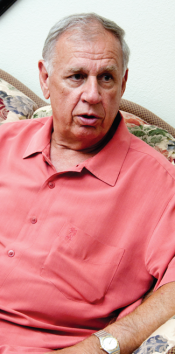
Being here is so important. The people see the volunteers coming down here, and they realize that someone cares. That’s so important. We had more than twelve thousand volunteer hours last year, and that’s amazing for an organization like this. It’s tough. My wife said, ‘It seem you have to take so much negativity down there,’ and she’s right, but Arthur and Jeannie take most of it.
After three or four numbers, the band steps down and cedes the platform to Arthur Horn. Horn’s talk, to label it a sermon doesn’t catch the concept. It’s about faith, but a faith that requires active participation. Salvation may be yours by faith alone, but the fruits of that transformation require an interactive effort. At one point, the speaker leaves the stage and moves into the audience, taking a seat in the second row, where his remarks continue on a more personal and direct level before he returns to the platform to close out his portion of the program.
Zerri Powers is the only full time paid employee of Four Rivers. Before that, she was a client with a long record of drug and alcohol abuse.
I accepted drug court because I wanted to get out of jail. It’s an eighteen month program, but it took me three and a half years to graduate. I didn’t… I couldn’t… I’d do all the things, all the requirements, but I never really took care of the core, those deep issues that led me to use drugs in the first place, never being good enough, never being okay, never being accepted, nobody loving me. I didn’t love myself, so of course nobody else could love me.
The deal is, the alcohol and the drugs are not really the problem. You take the drugs and alcohol away, and all those things we drank and used drugs to cover up are still there. That’s what our problems are. You can remove drugs and alcohol from somebody, but if they don’t change their thinking, don’t change in their heart, they’re still going to be users. Everything has to change. Everything.
Before Four Rivers, I could stay sober for about a year without dealing with the real issues in my life, and then it would all just bubble up. A little thing could spark it, and I’d say, ‘Screw it. I can’t do this. I’m not good enough. I can’t keep it up.’
The last time I relapsed, Judge Nall sent me down to Concho Valley, which is a six month, very intense program run by the State of Texas in San Angelo. It wasn’t a prison—I wore a uniform—but it wasn’t a ‘prison’ prison, but I couldn’t leave. Before I left, my counselor told me to find a place to be accountable to when I got home. ‘If you will follow through; if you will be a positive thinker every day, you can make it.’ I really wanted it to work, but I couldn’t get it in my mind that it was okay for me to be sober, okay for me to be alive actually, to be a human being.
When I got home from San Angelo, my sponsor sent me down here. I didn’t want to come. I knew about the place and I had a bad feeling about it. It was jealousy or envy, I guess. I walked in and saw Jeannie and said, ‘Whatever you do, don’t talk to me about God. God’s never loved me; God’s never done anything for me, and I won’t listen to God.’ And Jeannie said, ‘We’re not going to talk to you. We’re going to love just like you are.’
In the beginning, I would just pop in, hang out, eat, and then I started coming to classes. I came to every class they had. I’d come down here and have lunch with Jeannie and everybody, and then go back to work. I would come here in the morning, say good morning to Arthur, and then go on to work because it was knowing that people were happy to see me. No one in my life had ever been happy to see me, but here they would smile—‘We’re so glad to see you.’ I’d never had that in all of my life. I liked the feeling, even though I wasn’t sure what those feelings were, but I liked it.
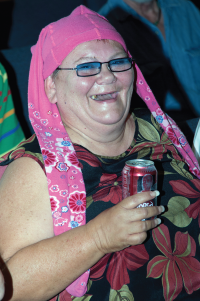 When I was trying to learn to stay sober and I met people, I was pretty sure they knew who I was, and they didn’t want me there. My brain said that. When I started coming over here, they knew, they knew because I told them, but they didn’t care. They knew I was in drug court, they knew I was a felon, they knew I was a drug addict, but they didn’t care. They just loved me. When they looked in my face and talked to me, I could tell that Jeannie and Arthur loved me. I began to get the feeling that I belonged somewhere, someone cared. I couldn’t get enough of this place. There is something about it, something about Jeannie and Arthur.”
When I was trying to learn to stay sober and I met people, I was pretty sure they knew who I was, and they didn’t want me there. My brain said that. When I started coming over here, they knew, they knew because I told them, but they didn’t care. They knew I was in drug court, they knew I was a felon, they knew I was a drug addict, but they didn’t care. They just loved me. When they looked in my face and talked to me, I could tell that Jeannie and Arthur loved me. I began to get the feeling that I belonged somewhere, someone cared. I couldn’t get enough of this place. There is something about it, something about Jeannie and Arthur.”
Supper is waiting, that staple of the mid-American, sloppy joes, and the formal portion of the evening is over. The participants break into small groups to eat and talk and laugh before drifting out into the muggy summer night and another week of struggle against the amalgam of circumstances that would tempt them back to ill-advised choices that have plagued them in the past.
Those who come regularly to these meeting go back into the world knowing that they are not alone. There are others who understand and are waiting to offer a supporting presence without a reproving glance or rebuke. The old timers have learned to accept and believe in this unconditional offering of love, and the new comers, if they come back, if they step up and make the effort, will learn it too. They will see that their lives need not be defined by one or a dozen missteps and that the only real failure lies in not trying again, not taking the next step forward.
Judge Rim Nall
Standing at the fore of innovative efforts to make a difference in the growing problems related to drug and alcohol abuse in Texoma is Rayburn “Rim” Nall, judge of the 59th District Court of Grayson County. It was through the efforts of Judge Nall that Grayson County established its drug court in 2006. Grayson County also has a Family Drug Court under the supervision 15th District Judge Jim Fallon.
Drug Court is a type of intensive supervision through judicially-led treatment programs for offenders whose history or assessment suggests that they might benefit from alternatives to straight incarceration. In 2001, the Texas legislature mandated that all counties exceeding 550,000 in population apply funding from federal and other sources to establish these courts and permitted other counties to do so if they wished.
“The idea of drug courts started in 1985 in a court in Florida,” said Nall. I first learned about it when I was working on a Masters in Judicial Studies at the University of Nevada in 1997. When I came back here, I started talking about the idea with the county’s chief probation officer, Dennis Cowhig. We both liked the idea and decided we wanted to do that, so we started planning—talking really—and started gathering information. We started the program about five and a half years ago.
“People have to apply to go into the program. You have to have an addiction, and we try to take the worst of the worst. We try to keep people out of prison, but at the same time, provide enough supervision to help them turn sober. Typically it’s a combination of drugs and alcohol. Seventy percent are meth users. Often they have mental disorders or substance abuse disorders, as well, so we try to coordinate with MHMR, as well.”
All are awaiting trial in Judge Nall’s court, and must be willing to plead guilty to the charges against them. The drug court program is a post adjudication procedure. Sexual abusers and violent offenders are precluded from participation. Candidates for drug court are screened by a drug court panel of twelve people, including probation officers, prosecutors, defense attorneys, a psychologist, and treatment providers. “We’ll interview the candidate and ask questions, trying to find out how sincere they are about getting clean and sober,” said Nall. “We make the decision by a majority vote. If they are rejected, they just go back into the system.”
The program lasts eighteen months and is intensely supervised. “They have to report three times a week,” Nall said. “They have to be drug tested three to four times a week. They have to go to AA (Alcoholics Anonymous) every day. They have to go to individual and group counseling. Those are the basic requirements.”
The program also has a bit of the carrot and stick approach. “If they do good, they are rewarded. If they mess up, they are punished,” said Nall. “We have several people picking up trash along the highway this week. We use graduated sanctions that get harder with each misstep. As a condition of probation, we can sentence them to up to six months in the county jail. We understand that people with an addiction are going to relapse, but if they get arrested, they’re out.”
Does it work? “Eighty percent of the drug court participants do not relapse or get arrested. It’s a remarkable figure,” said Nall.
This article appeared in the August 2010 issue of Texoma Living!.

“The greatest disease in the West today is not TB or leprosy; it is being unwanted, unloved, and uncared for. We can cure physical diseases with medicine, but the only cure for loneliness, despair, and hopelessness is love. There are many in the world who are dying for a piece of bread but there are many more dying for a little love. The poverty in the West is a different kind of poverty — it is not only a poverty of loneliness but also of spirituality. There’s a hunger for love, as there is a hunger for God.”
― Mother Teresa, A Simple Path: Mother Teresa
I can see that you are trying to fill the void.
Thank you
Arthur